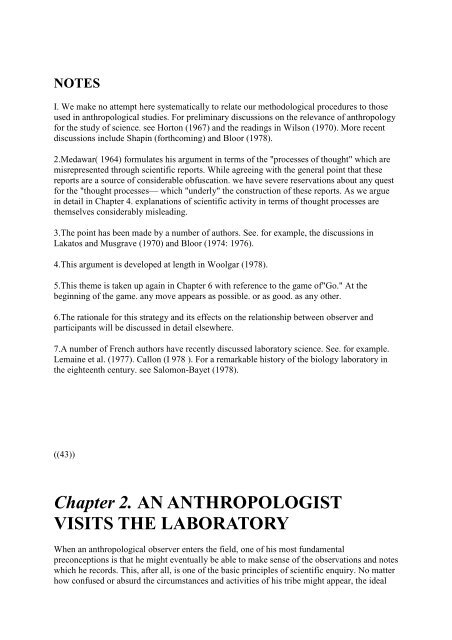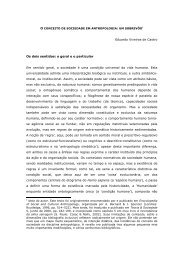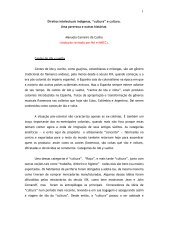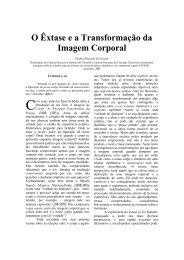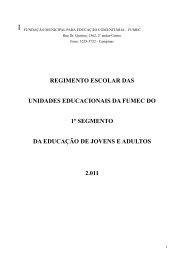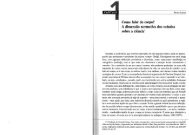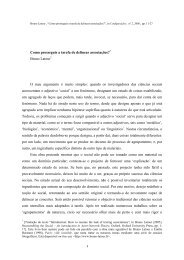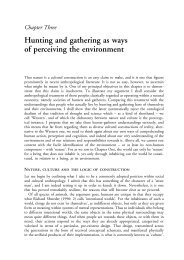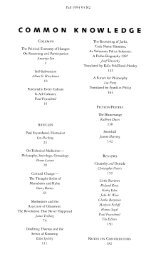- Page 1 and 2: Latour, Bruno og Woolgar, Steve (19
- Page 3 and 4: Noter. Teksten har sluttnoter, som
- Page 5 and 6: Princeton University Press books ar
- Page 7 and 8: The Construction and Dismantling of
- Page 9 and 10: "If sociology could not be applied
- Page 11 and 12: He has tried to observe scientists
- Page 13 and 14: ((15))Chapter 1. FROM ORDER TO DISO
- Page 15 and 16: ((17))(or decrease) a few points, r
- Page 17 and 18: scientists, we decided to construct
- Page 19 and 20: phenomena occasionally make their p
- Page 21 and 22: ((23))investigate the nature of thi
- Page 23 and 24: frequently presented areas of scien
- Page 25 and 26: concepts as a phenomenon to be expl
- Page 27 and 28: misunderstood, if accorded the high
- Page 29 and 30: are less tempted, therefore, to try
- Page 31 and 32: that they are also confronted with
- Page 33 and 34: inconsistency and lack of clarity,
- Page 35 and 36: science. Very crudely, if Mertonian
- Page 37: In Chapter 2, we portray the labora
- Page 41 and 42: What is the relationship between se
- Page 43 and 44: ats. Sometimes they use coloured pa
- Page 45 and 46: the main upshot of the prolonged se
- Page 47 and 48: ((53))suggest that much informal co
- Page 49 and 50: Mulkay et al., 1975). However, the
- Page 51 and 52: ((58))ising the characteristics of
- Page 53 and 54: ((60))delays the gradual movement o
- Page 55 and 56: an analog of LRF which would inhibi
- Page 57 and 58: It follows that if our observer was
- Page 59 and 60: new problem area. In the next chapt
- Page 61 and 62: equipment. In this case, scientists
- Page 63 and 64: and the nature of the peptides actu
- Page 65 and 66: made little sense outside the speci
- Page 67 and 68: communicating "important findings."
- Page 69 and 70: ((78))terised by the presence or ab
- Page 71 and 72: variables together with a reference
- Page 73 and 74: xxx figur 2.3 start xxxFigure 2.3Th
- Page 75 and 76: documents and modalities which cons
- Page 77 and 78: literature, inscription devices, do
- Page 79 and 80: 4.See note 2.((89))5.This notion of
- Page 81 and 82: Science, Berkeley, California, Augu
- Page 83 and 84: ((97))Photograph 7: FRACTIONATING C
- Page 85 and 86: ((104))((105))Chapter 3. THE CONSTR
- Page 87 and 88: never will be) involved, have acces
- Page 89 and 90:
Den venstre vertikale aksen heter "
- Page 91 and 92:
In fact, these alternative formulat
- Page 93 and 94:
We constructed a file of all articl
- Page 95 and 96:
Ved fire punkter langs den diagonal
- Page 97 and 98:
The decision to obtain the structur
- Page 99 and 100:
The present case appears to fit fai
- Page 101 and 102:
In one important sense, then, TRF d
- Page 103 and 104:
contained system ... that is the re
- Page 105 and 106:
initial existence within a local co
- Page 107 and 108:
fraction. By 1966, an almost pure m
- Page 109 and 110:
In addition, past experience had le
- Page 111 and 112:
vice versa) we identified the natur
- Page 113 and 114:
Her skal følgende syntaks brukes:
- Page 115 and 116:
It is clear that if Schally had not
- Page 117 and 118:
operations is a fairly good approxi
- Page 119 and 120:
emerged. At the end of 1968, the si
- Page 121 and 122:
note that, "incidentally we were th
- Page 123 and 124:
One indirect means of determining t
- Page 125 and 126:
appear to contradict this statement
- Page 127 and 128:
TRF Moves into Other NetworksThe pu
- Page 129 and 130:
((150))essay for Thyrotropin," whic
- Page 131 and 132:
Our examination of the daily activi
- Page 133 and 134:
however, notes were compiled which
- Page 135 and 136:
Flower: The threshold is 1 ug. . .
- Page 137 and 138:
Smith: And its dangerous because th
- Page 139 and 140:
LPH.... [Rose went on to explain wh
- Page 141 and 142:
knowledge, to the relative efficacy
- Page 143 and 144:
They don't know their business. It
- Page 145 and 146:
((166))degradate quickly and from t
- Page 147 and 148:
((168))The Sociological Analysis of
- Page 149 and 150:
Sara mentioned at the end of her pr
- Page 151 and 152:
e partially overcome by in situ obs
- Page 153 and 154:
depicted to be. Precisely because t
- Page 155 and 156:
not real, nor that they are merely
- Page 157 and 158:
constructed phenomena, such as chro
- Page 159 and 160:
((181))xxx figur 4.2 start xxxFigur
- Page 161 and 162:
induction that the statement holds
- Page 163 and 164:
((185))even the transcripts of conv
- Page 165 and 166:
material and social networks in whi
- Page 167 and 168:
apparently disparate aspects of lab
- Page 169 and 170:
fluctuations and drew lines to show
- Page 171 and 172:
material for exponents of what is o
- Page 173 and 174:
Then I went to a Congress at Eilat
- Page 175 and 176:
By chance, Parine put Dietrich to w
- Page 177 and 178:
ioassay was necessary to support an
- Page 179 and 180:
Figuren er formet som en sirkel, me
- Page 181 and 182:
gift exchange. According to Hagstro
- Page 183 and 184:
diabetes. It will soon be possible
- Page 185 and 186:
It would be mistaken to take the ce
- Page 187 and 188:
ability. The scientists and technic
- Page 189 and 190:
not to give tenure, to grant money,
- Page 191 and 192:
production of which depended on the
- Page 193 and 194:
[årstall] --- [Academic Position]
- Page 195 and 196:
Table 5.2Beskrivelse: Tabellen har
- Page 197 and 198:
((219))at the citation spectra of i
- Page 199 and 200:
((221))xxx figur 5.2.b start xxxFig
- Page 201 and 202:
creation of a new settlement, he ca
- Page 203 and 204:
B: Starter på ca. 15 siteringer i
- Page 205 and 206:
an area potentially much more rewar
- Page 207 and 208:
very quickly become a "has been." H
- Page 209 and 210:
of a valueless capital, the sole pu
- Page 211 and 212:
easons of space, we are unable to r
- Page 213 and 214:
((237))The second main concept whic
- Page 215 and 216:
The fifth concept used in our argum
- Page 217 and 218:
statements. The outcome of this for
- Page 219 and 220:
which makes construction possible.
- Page 221 and 222:
((246))amount of information in one
- Page 223 and 224:
Beskrivelse: Figuren viser et spill
- Page 225 and 226:
((251))The three brief analogies dr
- Page 227 and 228:
Throughout the argument, we have st
- Page 229 and 230:
By returning to the initial stages
- Page 231 and 232:
constructing accounts to be launche
- Page 233 and 234:
statement when it is more likely th
- Page 235 and 236:
((261))24.It seems that the basic p
- Page 237 and 238:
BLOOR, D. (1974) "Popper's mystific
- Page 239 and 240:
__(1975) "The seven sexes: a study
- Page 241 and 242:
GREEP, R. O. (1963) "Synthesis and
- Page 243 and 244:
LAKATOS, I. and MUSGRAVE, A. (1970)
- Page 245 and 246:
__(1975) "Norms and ideology in sci
- Page 247 and 248:
SCHALLY, A. V., REDDING, T. W., BOW
- Page 249 and 250:
((272))((273))POSTSCRIPT TO SECOND
- Page 251 and 252:
((275))isodes we avoided because th
- Page 253 and 254:
Laboratory Life is ultimately the p
- Page 255 and 256:
Lynch's criticism depends both on a
- Page 257 and 258:
our disposal are insufficient to fo
- Page 259 and 260:
such reading misses the point. We a
- Page 261 and 262:
3.Reviews and review articles which
- Page 263 and 264:
FLECK, LUDWIG (1979) The Genesis an
- Page 265 and 266:
LEPENIES, W. (1981) "Anthropologica
- Page 267 and 268:
((290))WOOLGAR, STEVE (1982) "Labor
- Page 269 and 270:
Brazeau, P., 186, 204Brillouin, L.,
- Page 271 and 272:
Economic model, as seen by the scie
- Page 273 and 274:
Kant, E., 175Kawabata, Y., 247Knorr
- Page 275 and 276:
Noise, 239 ff.Norms, 24; and counte
- Page 277 and 278:
Scharrer, B., 54, 77Schibuzawa, A.,
- Page 279:
Yalow, R. S., 64, 66Young, B., 230


